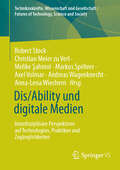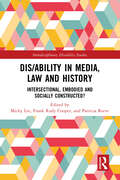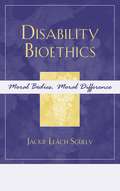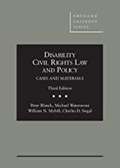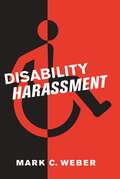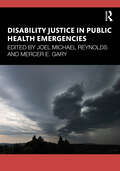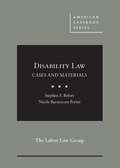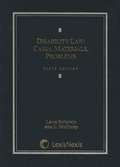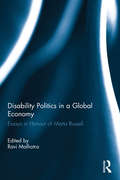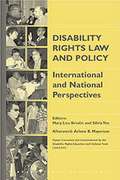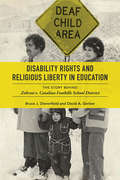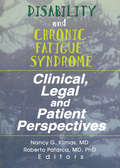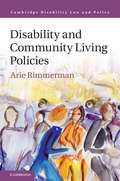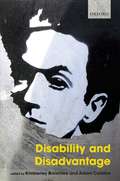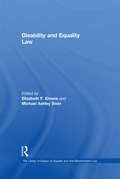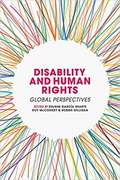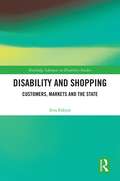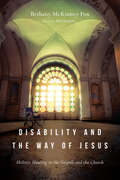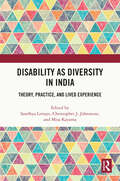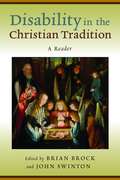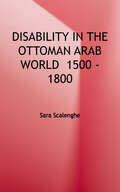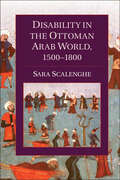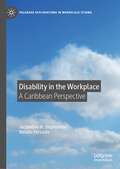- Table View
- List View
Dis/Ability und digitale Medien: Interdisziplinäre Perspektiven auf Technologien, Praktiken und Zugänglichkeiten (Technikzukünfte, Wissenschaft und Gesellschaft / Futures of Technology, Science and Society)
by Markus Spöhrer Christian Meier zu Verl Robert Stock Melike Şahinol Andreas Wagenknecht Axel Volmar Anna-Lena WiechernDer Sammelband analysiert das Verhältnis von digitalen Medien und Dis/Ability aus einer interdisziplinären Perspektive. Dis/Ability wird dabei als subjektives wie soziales und geschichtliches Phänomen verstanden, das aus den wechselseitigen Relationen behinderter Körper, Sinneserfahrungen und Technologien entsteht. Die Beiträge untersuchen aktuelle und historische Fallbeispiele im Kontext technologischer Innovationen, aktivistischer Praktiken und digitaler Zugänglichkeitsfragen.
Dis/ability in Media, Law and History: Intersectional, Embodied AND Socially Constructed? (Interdisciplinary Disability Studies)
by Micky LeeThis book explores how being "disabled" originates in the physical world, social representations and rules, and historical power relations—the interplay of which render bodies "normal" or not. Do parking signs that represent people in wheelchairs as self-propelling influence how we view dis/ability? How do wheelchair users understand their own bodies and an environment not built for them? By asking questions like these the authors reveal how normalization has informed people’s experiences of their bodies and their fight for substantive equality. Understanding these processes requires acknowledging the tension between social construction and embodiment as well as centering the intersection of dis/abilities with other identities, such as race, class, gender, sex orientation, citizen status, and so on. Scholars and researchers will find that this book provides new avenues for thinking about dis/ability. A wider audience will find it accessible and informative.
Disability Bioethics: Moral Bodies, Moral Difference
by Jackie Leach ScullyJackie Leach Scully argues that bioethics cannot avoid the task of considering the moral meaning of disability in humans--beyond simply regulating reproductive choices or new areas of biomedical research. By focusing on the experiential and empirical reality of impairment and drawing on recent work in disability studies, Scully brings new attention to complex ethical questions surrounding disability. Impairment is variously considered as a set of social relations and practices, as experienced embodiment, as an emancipatory movement, and as a biomedical phenomenon. In this way, disability is joined to the general late-twentieth-century trend of attending to difference as a significant and central axis of subjectivity and social life.
Disability Civil Rights Law And Policy, Cases And Materials (American Casebook)
by Peter Blanck Michael Waterstone William N. Myhill Charles D. SiegalThis casebook examines the development of disability rights law and policy in the United States and abroad and can be used as either a law or graduate school teaching tool. It gives a complete and current treatment of the Americans with Disabilities Act and the ADA Amendments Act, including the background of the statute's passage, definition of disability, discrimination in employment, public services, and public accommodations. It also gives in-depth coverage of other important federal disability discrimination statutes like the Individuals with Disabilities Education Act, Rehabilitation Act, and Fair Housing Amendments Act. This book is unique in that it offers extensive coverage of the rapidly developing area of international disability law, through discussion of the new UN Convention on Rights of Persons with Disabilities and related developments. The authors also offer detailed coverage of current policy issues involving taxation, health policy, and technology. The book has been streamlined significantly since the last edition.
Disability Harassment
by Mark C. WeberBuilding on the insights of both disability studies and civil rights scholars, Mark C. Weber frames his examination of disability harassment on the premise that disabled people are members of a minority group that must negotiate an artificial yet often damaging environment of physical and attitudinal barriers. The book considers courts’ approaches to the problem of disability harassment, particularly the application of an analogy to race and sex harassment and the development of legal remedies and policy reforms under the Americans with Disabilities Act (ADA). While litigation under the ADA has addressed discrimination in public accommodations, employment, and education, Weber points out that the law has done little to combat disability harassment. He recommends that arguments based on unused provisions of the ADA should be developed and new legal remedies advanced to address the problem. Disability Harassment also draws on case law to explore special problems of harassment in the public schools, and closes with an appeal to judges and lawmakers for expanded legal protection against harassment.
Disability Justice in Public Health Emergencies
by Joel Michael Reynolds Mercer E. GaryDisability Justice in Public Health Emergencies is the first book to highlight contributions from critical disability scholarship to the fields of public health ethics and disaster ethics. It takes up such contributions with the aim of charting a path forward for clinicians, bioethicists, public health experts, and anyone involved in emergency planning to better care for disabled people—and thereby for all people—in the future. Across 11 chapters, the contributors detail how existing public health emergency responses have failed and still fail to address the multi-faceted needs of disabled people. They analyze complications in the context of epidemic and pandemic disease and emphasize that vulnerabilities imposed upon disabled people track and foster patterns of racial and class domination.The central claim of the volume is that the ethical and political insights of disability theory and activism provide key resources for equitable disaster planning for all. The volume builds upon the existing efforts of disability communities to articulate emergency planning priorities and response measures that take into account the large body of qualitative and quantitative research on disabled people’s health, needs, and experiences. It is only by listening to disabled people’s voices that we will all fare better in future public health emergencies.The book will be of interest to scholars and graduate students working in bioethics, disability studies, public health policy, medical sociology, and the medical humanities.
Disability Law: Cases And Materials (American Casebook Series)
by Stephen Befort Nicole PorterThis casebook covers disability discrimination under the Americans with Disabilities Act and special education under the Individuals with Disabilities Education Act. It includes statutory text and court decisions in the areas of employment, government services, public accommodations, and education. The casebook incorporates a substantial number of cases decided after the enactment of the ADA Amendments Act. This casebook has a greater focus on employment issues than other casebooks and could support either a stand-alone disability discrimination in employment course or a broad-based disability law course. Each chapter contains streamlined notes and questions designed to provoke thoughtful class discussion.
Disability Law: Cases, Materials, Problems (Fifth Edition)
by Laura F. Rothstein Ann C. McginleyDisability Law: Cases, Materials, Problems takes a broad approach to understanding how disability discrimination laws apply to the kinds of cases attorneys, policymakers, and judges are likely to face. The new Fifth Edition adds analysis and discussion of the ADA Amendments Act throughout the book. It reorganizes and adds new cases and materials in the employment law chapter, including cases on harassment and retaliation based on disability. It also pays more attention to procedural issues (burden of proof), remedies and defenses, litigation and dispute resolution, and insurance. It adds a problem-based approach with chapters and sections of chapters beginning with a hypothetical scenario to be used as a basis for applying the substantive law. It also adds expanded Notes at the end of each section.
Disability Politics in a Global Economy: Essays in Honour of Marta Russell
by Ravi MalhotraWhile the visibility of disability studies has increased in recent years, few have thoroughly examined the marginalization of people with disabilities through the lens of political economy. This was the great contribution of Marta Russell (1951-2013), an activist and prominent scholar in the United States and best known for her analyses of the issues faced by people with disabilities. This book examines the legacy of Marta Russell, bringing together distinguished scholars and activists such as Anne Finger, Nirmala Erevelles and Mark Weber, to explicate current issues relevant to the empowerment of people with disabilities. Drawing from various fields including Law, Political Economy, Education and History, the book takes a truly interdisciplinary approach, offering a body of work that develops a dextrous understanding of the marginalization of people with disabilities. The book will be of great use and interest to specialists and students in the fields of Political Economy, Law and Society, Labour Studies, Disability Studies, Women’s Studies, and Political Science.
Disability Rights Law and Policy: International and National Perspectives
by Mary Lou Breslin Silvia YeeThis volume describes the extraordinary success of the international political movement of people with disabilities to include disability as a human rights issue. The authors are renowned disability rights attorneys, university professors, and activists who practice, teach and work internationally.
Disability Rights and Religious Liberty in Education: The Story behind Zobrest v. Catalina Foothills School District (Disability Histories #12)
by David A. Gerber Bruce J. DierenfieldIn 1988, Sandi and Larry Zobrest sued a suburban Tucson, Arizona, school district that had denied their hearing-impaired son a taxpayer-funded interpreter in his Roman Catholic high school. The Catalina Foothills School District argued that providing a public resource for a private, religious school created an unlawful crossover between church and state. The Zobrests, however, claimed that the district had infringed on both their First Amendment right to freedom of religion and the Individuals with Disabilities Education Act (IDEA). Bruce J. Dierenfield and David A. Gerber use the Zobrests' story to examine the complex history and jurisprudence of disability accommodation and educational mainstreaming. They look at the family's effort to acquire educational resources for their son starting in early childhood and the choices the Zobrests made to prepare him for life in the hearing world rather than the deaf community. Dierenfield and Gerber also analyze the thorny church-state issues and legal controversies that informed the case, its journey to the U.S. Supreme Court, and the impact of the high court's ruling on the course of disability accommodation and religious liberty.
Disability Rights and Religious Liberty in Education: The Story behind Zobrest v. Catalina Foothills School District (Disability Histories)
by David A. Gerber Bruce J. DierenfieldIn 1988, Sandi and Larry Zobrest sued a suburban Tucson, Arizona, school district that had denied their hearing-impaired son a taxpayer-funded interpreter in his Roman Catholic high school. The Catalina Foothills School District argued that providing a public resource for a private, religious school created an unlawful crossover between church and state. The Zobrests, however, claimed that the district had infringed on both their First Amendment right to freedom of religion and the Individuals with Disabilities Education Act (IDEA). Bruce J. Dierenfield and David A. Gerber use the Zobrests' story to examine the complex history and jurisprudence of disability accommodation and educational mainstreaming. They look at the family's effort to acquire educational resources for their son starting in early childhood and the choices the Zobrests made to prepare him for life in the hearing world rather than the deaf community. Dierenfield and Gerber also analyze the thorny church-state issues and legal controversies that informed the case, its journey to the U.S. Supreme Court, and the impact of the high court's ruling on the course of disability accommodation and religious liberty.
Disability and Chronic Fatigue Syndrome: Clinical, Legal, and Patient Perspectives
by Nancy G. Klimas Roberto PatarcaBecause of the individual and varying symptoms of chronic fatigue syndrome, medical guidelines encompassing the needs of every patient simply do not exist. Through proven research and recommendations for future treatment, Disability and Chronic Fatigue Syndrome: Clinical, Legal, and Patient Perspectives discusses the difficult subject of how to diagnose disability in chronic fatigue syndrome patients, how to determine the severity of a patient’s disability, and how new disability guidelines would make more chronic fatigue patients eligible to apply for disability benefits. From this information, you will gain a clearer understanding of chronic fatigue syndrome, enabling you to more accurately assess a patient’s condition or decide if your client is eligible for disability benefits. Essential for clinicians, lawyers, patients, and medical insurers, Disability and Chronic Fatigue Syndrome provides an outline of disability guidelines established by the Social Security Administration (SSA), the Veterans’Administration, and the American Medical Association, as well as federal guidelines. While gaining information on the different types of disability insurance available to chronic fatigue patients, such as the Long Term Disability (LTD) policy, you will also learn how standard procedures such as psychiatric evaluation, neuropsychological testing, and physical capacity measurement can both help and hinder the process of determining disability in a patient. In addition, Disability and Chronic Fatigue Syndrome provides insight into: the symptoms of chronic fatigue syndrome, such as inability to work and level of stamina, in accordance with medical and legal definitions disability guidelines set by the SSA how patients’varying symptoms and conflicting findings affect disability diagnosis in chronic fatigue syndrome patients by SSA standards plans by the Chronic Fatigue Immune Dysfunction Syndrome (CFIDS) Association of America to work with the SSA concerning strategies to dissolve barriers to Social Security Disability Income Benefits for patients and to advocate for up-to-date information on CFIDS in the SSA’s Listing of Impairments. tips on applying for SSA benefits claims that insurance companies have used misleading surveillance videos and fraud to discontinue disability benefits to patients in need of coverage Since the Social Security Administration does not currently consider a CFIDS diagnosis enough to win a disability claim, Disability and Chronic Fatigue Syndrome also contains many recommendations for improving federal disability guidelines, such as using results from functional evaluations, neuropsychological testing, and exercise endurance testing as evidence of impairment. For less severe cases, this book provides you with suggestions for rehabilitation of CFS patients before disability claims are made, including patient training and education, dependency counseling, muscular conditioning, and occupational therapy. Whether you are a patient, clinician, lawyer, or medical insurer, Disability and Chronic Fatigue Syndrome will guide you through the complex issues surrounding disability and this intricate disease.
Disability and Community Living Policies (Cambridge Disability Law and Policy Series)
by Arie RimmermanThis book provides a comprehensive analysis of the roots of institutionalization, deinstitutionalization legislation and policies of the twentieth century, and twenty-first-century efforts to promote community living policies domestically and internationally, particularly through the role of the United Nations Convention on the Rights of Persons with Disabilities (UNCRPD), a landmark treaty adopted on 13 December 2006. Rimmerman shows that deinstitutionalization and community living cannot be examined only in terms of the number of institutions closed but also through the substantial change in values, legislation, and policies supporting personalization, as well as the social participation of people with disabilities. The book includes a significant exploration of United States legislation and important Supreme Court decisions compared with European policies toward community living. Finally it discusses the importance of Articles 12 and 19 of the convention and demonstrates the case of Israel that has used the convention as a road map for proposing a new community living policy. Provides insightful views of the shift from institutionalization to human rights approaches Demonstrates how Articles 12 and 19 of the UN convention can be implemented at national level Analyzes the differences between European and United States policies toward community living
Disability and Disadvantage
by Kimberley Brownlee Adam CuretonThis book offers a much-needed investigation of moral and political issues concerning disability, and explores how the experiences of people with disabilities can lead to reconsideration of prominent positions on normative issues. Thirteen new essays examine such topics as the concept of disability, the conditions of justice, the nature of autonomy, health care distribution, and reproductive choices. The contributors are Norman Daniels, Ellen Daniels Zide, Leslie P. Francis, Christie Hartley, Richard Hull, Guy Kahane, F. M. Kamm, Rosalind McDougall, Jeff McMahan, Douglas MacLean,Susannah Rose, Anita Silvers, Julian Savulescu, Lorella Terzi, David Wasserman, and Jonathan Wolff.
Disability and Equality Law (The\library Of Essays On Equality And Anti-discrimination Law Ser.)
by Elizabeth F. EmensThis interdisciplinary collection of essays addresses the theoretical, practical and legal dimensions of equality for persons with disabilities. The issues covered include the central problem of defining disability and impairment; the dilemma of same versus different treatment; the balance between autonomy and external influence and support; linkages to other anti-discrimination categories such as race and sex; the place of disability theory within identity politics; and issues of life, death, and our most intimate relationships. The articles reflect a wealth of international viewpoints and interdisciplinary areas which include philosophy, economics, memoirs, cultural studies, empirical studies and legal scholarship. The selection also includes classic texts which set out foundational ideas such as the social model of disability or the goal of integration, alongside essays that critique these conceptual mainstays. This volume brings into sharp focus a wide range of contentious and complex issues in the field of disability studies and is of interest to researchers and students from a wide range of fields.
Disability and Human Rights: Global Perspectives
by Edurne García Iriarte Robbie Gilligan Roy McConkeyExperienced by more than one billion people worldwide, disability is increasingly recognised as a human rights issue internationally. Completely up to date, Disability and Human Rights draws on cutting edge international research and real life examples to explore the global dimension of disability and to critically review progress on the implementation of the United Nations Convention on the Rights of Persons with Disabilities. <P><P> This book provides readers with an in-depth exploration of disability across key areas of hu-man rights, including health, education, employment, accessibility and independent living. It demonstrates how these issues are integral to achieving full and equal participation of disa-bled people in human societies across the life cycle. The book analyses the impact of poverty, the importance of support and the relevance of culture and it maps out how to make disability rights a reality in the coming decades. <P><P> Chapters are enriched with a wide range of international case examples and questions for reflection to deepen readers' understanding of the material. Students and practitioners from a wide range of backgrounds, including disability studies, human rights, social work and social care will benefit from this much-needed new global perspective on disability.
Disability and Information Technology
by Eliza VarneyDisability and Information Technology examines the extent to which regulatory frameworks for information and communication technologies (ICTs) safeguard the rights of persons with disabilities as citizenship rights. It adopts a comparative approach focused on four case studies: Canada, the European Union, the United Kingdom and the United States. It focuses on the tension between social and economic values in the regulation of ICTs and calls for a regulatory approach based on a framework of principles that reflects citizenship values. The analysis identifies challenges encountered in the jurisdictions examined and points toward the rights-based approach advanced by the UN Convention on the Rights of Persons with Disabilities as a benchmark in protecting the rights of persons with disabilities to have equal access to information. The research draws on a wealth of resources, including legislation, cases, interviews, consultation documents and responses from organisations representing persons with disabilities.
Disability and Shopping: Customers, Markets and the State (Routledge Advances in Disability Studies)
by Ieva EskytėDisability and Shopping:Customers, Markets and the State provides an examination of the diverse experiences and perspectives of disabled customers, industry and civil society. It discusses how the interaction between the three stakeholders should be shaped at aiming to decrease inequality and marginalisation. Shopping is a part of everyday modern life and yet businesses struggle to adequately meet the needs of 80 million disabled customers in the European Union single market. While there has been extensive research into how individuals engage in customer roles and experience, and how businesses and policies both shape and respond to these, little is known of the same dynamics and practices regarding people with impairments. This book addresses this need by revealing the perspectives, interactions and experiences of disabled customers and their interaction with policy and business. It will be required reading for all scholars and students of disability studies, sociology, marketing and customer relations.
Disability and the Way of Jesus: Holistic Healing in the Gospels and the Church
by Bethany McKinney FoxWhat does healing mean for people with disabilities? The Gospels are filled with accounts of Jesus offering physical healing. But even as churches today seek to follow the way of Jesus, people with disabilities all too often experience the very opposite of healing and life-giving community: exclusion, judgment, barriers. Misinterpretation and misapplication of biblical healing narratives can do great damage, yet those who take the Bible seriously mustn't avoid these passages either. Bethany McKinney Fox believes that Christian communities are better off when people with disabilities are an integral part of our common life. In Disability and the Way of Jesus, she considers how the stories of Jesus' healings can guide us toward mutual thriving. How did Jesus' original audience understand his works of healing, and how should we relate to these texts today? After examining the healing narratives in their biblical and cultural contexts, Fox considers perspectives from medical doctors, disability scholars, and pastors to more fully understand what Jesus does as he heals and how he points the way for relationships with people with disabilities. Personal reflections from Christians with disabilities are featured throughout the book, which concludes with suggestions for concrete practices adaptable to a variety of church settings. Bridging biblical studies, ethics, and disability studies with the work of practitioners, Fox provides a unique resource that is both theologically grounded and winsomely practical. Disability and the Way of Jesus provides new lenses on holistic healing for scholars, laypeople, and ministry leaders who care about welcoming all people as Jesus would.
Disability as Diversity in India: Theory, Practice, and Lived Experience
by Christopher J. Johnstone Misa Kayama Sandhya LimayeThis book critically analyses diverse experiences related to disability in India. Drawing upon intersectionality theory, it explores a range of issues regarding everyday experiences of disability in relation to gender, religion, social experiences, and India’s neoliberal economy and its built environment. From theoretical to deeply personal, this book discusses themes like invisible disability and identity; women with disabilities in India; bodily frustrations and cultural stigma; emotional stability and self-esteem of children with disabilities; neurodiversity and queerness; and overcoming the barriers. It also emphasizes the impact of the writings of women with disabilities on their personal experiences. The volume discusses perspectives and practices of schooling, curricular transactions, and inclusive education that have evolved for children who are deaf in India.Conversational and interdisciplinary, this book will be of interest to scholars and practitioners of disability studies, social care, mental health, social psychology, gender studies, social work, and special education.
Disability in the Christian Tradition: A Reader
by John Swinton Brian BrockFor two millennia Christians have thought about what human impairment is and how faith communities and society should respond to people with perceived impairments. But never has one volume collected the most significant Christian writings on disability. This book fills that gap. Brian Brock and John Swinton's Disability in the Christian Tradition brings together for the first time key writings by thinkers from all periods of Christian history - including Augustine, Aquinas, Julian of Norwich, Luther, Calvin, Hegel, Kierkegaard, Bonhoeffer, Barth, Hauerwas, and more. Fourteen contemporary experts in theology and disability studies guide readers through each era or group of thinkers, offering clear commentary and highlighting important themes.
Disability in the Ottoman Arab World, 1500-1800 (Cambridge Studies in Islamic Civilization Ser.)
by Sara ScalenghePhysical, sensory, and mental impairments can influence an individual's status in society as much as the more familiar categories of gender, class, religion, race, and ethnicity. This was especially true of the early modern Arab Ottoman world, where being judged able or disabled impacted every aspect of a person's life, including performance of religious ritual, marriage, job opportunities, and the ability to buy and sell property. Sara Scalenghe's book is the first on the history of both physical and mental disabilities in the Middle East and North Africa, and the first to examine disability in the non-Western world before the nineteenth century. Unlike previous scholarly works that examine disability as discussed in religious texts such as the Qur'an and the Hadith, this study focuses on representations and classifications of disability and impairment across a wide range of biographical, legal, medical, and divinatory primary sources.
Disability in the Ottoman Arab World, 1500-1800 (Cambridge Studies in Islamic Civilization)
by Sara ScalenghePhysical, sensory, and mental impairments can influence an individual's status in society as much as the more familiar categories of gender, class, religion, race, and ethnicity. This was especially true of the early modern Arab Ottoman world, where being judged able or disabled impacted every aspect of a person's life, including performance of religious ritual, marriage, job opportunities, and the ability to buy and sell property. Sara Scalenghe's book is the first on the history of both physical and mental disabilities in the Middle East and North Africa, and the first to examine disability in the non-Western world before the nineteenth century. Unlike previous scholarly works that examine disability as discussed in religious texts such as the Qur'an and the Hadith, this study focuses on representations and classifications of disability and impairment across a wide range of biographical, legal, medical, and divinatory primary sources.
Disability in the Workplace: A Caribbean Perspective (Palgrave Explorations in Workplace Stigma)
by Natalie Persadie Jacqueline H. StephensonThis work critically examines diversity, discrimination, and inclusion in the English-speaking Caribbean nations, with a specific emphasis on persons with disabilities. The chapters include an evaluative analysis on the extant theoretical and empirical literature on persons with disabilities in employment, exploring the nature of their disability, the role of information technology in gaining and retaining employment, and an analysis of the laws and relevant policies which prohibit the discrimination against persons with disabilities in the Caribbean region. Though the enactment of legislation outlawing the discrimination of persons with disabilities is not widespread in the Caribbean, a few select territories have taken positive steps towards recognition of the need to achieve inclusion of persons with disabilities and accept the diversity of the Caribbean populace.After exploring the general state of disability and discrimination in the Caribbean region, the authors analyze workplace accommodations provided to persons with disability, particularly as relations to IT and assistive devices, before focusing on workplace stigmas related to mental health disability and employment law.In addition to literature-based analyses, the book includes qualitative case studies, with the goal of providing benchmarks in organizational responses to employees with disabilities. Further, the authors highlight lessons to be learned from other countries in addressing inequality in the workplace for disabled persons.With its analysis of employment as well as socio-economic and legal issues, this interdisciplinary text will serve as a useful resource in not only understanding the organizational challenges faced by persons with disabilities in the region but also the necessary legislation needed to address discriminatory practices on a wider scale.
